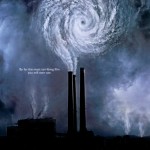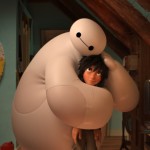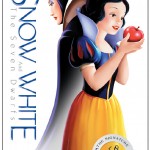The fact that Queen Rock Montreal (★★★★★) is the best concert film I have ever seen is not what makes it hard to write about. Movie critics, like poets, spend lifetimes trying to breathe new life into old forms and trite expressions. There is always a new way to express a superlative or to make a slam yet more snarky.
My former drama instructor always used to say, though, that the highest praise for a performance was not that it engendered artistic appreciation but that it prompted personal feeling. Queen Rock Montreal, which recently received a theatrical re-release via Fathom Events on the thirty-third anniversary of the concerts (the film was made over two days) and twenty-third anniversary of Freddie Mercury’s death, is such a film. I never saw the band–I never met the man–but these songs, like rings in a tree, somehow seem to chart my life. Songs more so than novels or even films have the capacity to bend space and time, merging the present moment with powerful memories from our past.
“Buddy you’re a boy make a big noise
Playin’ in the street gonna be a big man some day”
In November of 1981, I was a fifteen year-old, white, straight, suburban high-school student. I knew gay people; I just didn’t yet know that I knew them. I knew the songs “We Will Rock You” and “We are the Champions,” and it never would have occurred to me that singing along with them might be countenancing the “gay lifestyle,” whatever that was. (For the record, Freddie Mercury is described in most biographical accounts I have read as bisexual, which might get too often lumped together with being gay but is actually a different thing, right?).
Earlier that same year The Center for Disease Control published a morbidity report describing lung infections in five gay males. The Associated Press and Los Angeles Times reported the story, and soon the CDC began receiving reports from doctors all across the country. AIDS reporting had begun, even though AIDS did not yet have a name. The CDC would first use the term AIDS the following year, in 1982, though President Ronald Reagan would not publicly utter that word until three years later, at a press conference in 1985.
Historical hindsight always adds a layer of bitter irony to our archival footage and documentaries. Knowing that Mercury would die ten years to the day after the performance you are watching lends Queen Rock Montreal a surreal feeling. Memory compresses time, and ten years seems like both an eternity and the blink of an eye. There were other performances yet to come–“Radio Ga Ga,” “The Show Must Go On,” and my personal favorite, “I Want It All” had not yet been written. But given that Mercury was thirty-five and at the height of his performing powers, surely even the most hardened and intolerant hearts will forgive me for feeling the disease robbed us of decades of new work. By the time I was old enough to appreciate Queen’s music, Mercury was in the ground. I never got to see the group live; the Montreal concern is, in so many ways, an invitation to imagine what might have been.
Each morning I get up I die a little
Can barely stand on my feet
Take a look in the mirror and cry
Lord what you’re doing to me
I have spent all my years in believing you
But I just can’t get no relief,
Lord!
Somebody, somebody
Can anybody find me somebody to love?
Brian May was ranked by Rolling Stone as one of the top thirty guitarists of all time. Readers at Planet Rock and Guitar World placed him in the Top 10. Roger Taylor has a drum solo in the film that will blow your mind, and he hits some high notes in harmony that less attentive listeners might simply attribute to Mercury. John Deacon plays bass guitar. One of the joys of the concert film is not just seeing one legendary performer at the peak of his powers but also witnessing how a team can be so totally in tune with one another. Recent biopics such as Get On Up and Jersey Boys have juxtaposed the personal animosities that plagued successful groups. I am sure Queen had some; it’s impossible to live and work closely with anyone and not occasionally butt heads. But I kept looking for some indication of friction in the band, and I saw it not. Apparently in some of the band’s later albums, they moved away from individual writing credits and simply attributed the writing to Queen. We live in an age of individual glory; bands and sports are some of the last places where we witness true collaboration.
This is your life
Don’t play hard to get
It’s a free world
All you have to do is fall in love
Play the game,
Everybody play the game of love
Ultimately, though, a band may be collaborative, but the camera can only point at one person at a time. And most of the time it’s looking at Freddie.
Mercury’s performance is jaw dropping in its confidence. Yes, he divests himself of more and more of his clothing as the concert progresses and he moves from jacket, to Superman tank top, to bare chest, to some high-riding skivvy style shorts. (A bandanna and cap from the local hockey team come and go, perhaps giving hints for the eagle-eyed of which songs were recorded on which night.) And yes he twerks his microphone pole and plays air guitar in ways that tend to make straight, white, suburban Christian males blush. He would look silly, I guess, if there were half an ounce of self-consciousness in his performance.
But there isn’t. It’s such a generous performance, so authentic, so transparent, that it’s simply impossible to not admire it and–yes–envy his abandon just a little. There is–or can be–an affected quality to so much musical preening that it actually becomes a performative mask that singers or actors can hide behind. Certainly when I watch Elvis sway his hips or Mick Jagger extend his tongue, I sometimes feel as though I am watching performers play a role. Maybe it was a role for Mercury, too, but his performance always seems to draw us in rather than invite us to stand apart to admire it. The best rock concerts are communal rather than aesthetic experiences. With Freddie, I always feeling as though he is giving the performances to us rather than feeding off our energy and admiration.
And I’ll insist that if you listen to the music and lyrics there is a broader emotional palette than we are used to hearing from pop music or even rock. The deep depression of “sometimes I wish I’d never been born at all” that pokes its head out early in “Bohemian Rhapsody” and just as quickly disappears is so much more telling and heartbreaking than the bathetic self-indulgent pain of the modern angry ballad. (See for example Meat Loaf’s “Life is a Lemon.”) The totally recognizable mix of appeal and complaint in the prayerful form of “Somebody To Love” does more to convince the straight reader that our feelings are the same (even if they are directed at different objects) than all of Milk‘s speeches put together.
Too late, my time has come,
Sent shivers down my spine,
Body’s aching all the time.
Goodbye, everybody, I’ve got to go,
Gotta leave you all behind and face the truth.
Mostly, though, there is the exquisite narrative of “Under Pressure,” which seamlessly transitions from the social to the personal by reminding us–okay, reminding me–of the indissoluble connection between loving our neighbors and loving ourselves. When Mercury asks the question, “why can’t we give love that one more chance?” I always get the shivers down my spine. “Why can’t we give love, give love, give love, give love, give love, give love, give love, give love” is a persistent, hounding sentiment that is somehow both challenging and comforting. Could social problems, religious question, have such simple answers?
‘Cause love’s such an old-fashioned word
And love dares you to care for
The people on the edge of the night
And love dares you to change our way of
Caring about ourselves…
There. Right there. See how the song shifts from a challenge to care for the poor, tired, huddled masses, living on the “edge of the night” to the profound truth that doing so is a form of caring about ourselves? We are all broken, rich or poor, young or old, and–yes–gay or straight. We have all been on the edge of the night and, if we are lucky, have had people who dared to love us in our brokenness.
Beyond that, though, there is a still deeper truth. Hatred is a cancer. There is one way of caring about ourselves that entails acquiring as much as we can and protecting our advantages and privileges zealously so as to guard and preserve the way of life that has afforded us some clean, well-lighted places on the edge of the night. But perhaps there is another way of caring about ourselves; one that doesn’t involve surrendering our most deeply held beliefs but does involve questioning our assumptions about how we are to respond to those who do not share them. Love dares you to care for them. Not just their physical needs, but their deepest, core selves. To the extent you answer that challenge–and I have only done so falteringly and tentatively in my half-century walking this earth–you discover a truth well worth knowing. The more we practice loving others, the more equipped we are to love ourselves.
I think that’s a Christian truth. Or, at the very least, I think it is compatible with Christian teaching. I never learned it in church, though.
I learned it from Freddie Mercury.
https://www.youtube.com/watch?v=2FG5KvGA2KQ











